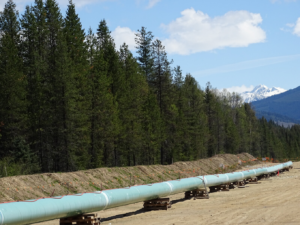Economic Growth is Bad for Your Breath(s)
by Gregory M. Mikkelson
Several years ago, some university students invited me to debate a hard-core mainstream economics professor on the topic of divestment from fossil fuel. Sadly but predictably, the economist lauded the fossil fuel industry for its role in boosting economic growth. At one point, he cited India as an example of how wonderful such growth is for people.
The moderator, from India himself, felt compelled to step in, explaining that he could not stand to live there anymore. He cited the country’s notorious air pollution as a reason for leaving. This brief exchange laid bare a key consequence of conflating development with fossil-fueled economic growth: the steep global rise in deadly air pollution.
Air Pollution: A Seriously Underrated Threat to Health
While the horrors of the coming climate chaos are the main reason for hastening the end of fossil fuel, air pollution provides another powerful argument. Air pollution is a massive killer today, causing over four million premature deaths per year and hacking a full year off of global life expectancy. Air pollution has also substantially reduced global average IQs, and increased depression and other mental disorders. Moreover, it has increased a host of physical ills, including diabetes, diseases of the heart and lungs, strokes, and fatal conditions in newborn babies. Thus, quite apart from its climate impacts, plain old-fashioned air pollution provides a compelling reason to unhook society from fossil fuel. As we shall see, that means unhooking us from economic growth.
Studies over the past decades have established the dangers of “particulate matter”—aka, PM or soot—in air pollution. Its most dangerous form is PM2.5. The digits refer to the particles’ size: less than 2.5 millionths of a meter in diameter (around one ten-thousandth of an inch). These tiny bits are now understood to be an especially pernicious constituent of air pollution.

Smog increasingly smothers many cities. (CC BY 2.0, Store norsk lexicon CC BY 2.0)
The Losing Battle against Air Pollution
At rest, adult humans take between 12 and 16 breaths per minute. In a world full of pollution, meeting this ongoing, immediate need for oxygen has long-term consequences for our health. A recent report from the Energy Policy Institute at the University of Chicago summed up the situation: “Working unseen inside the human body, the deadly effects of PM2.5 on the heart, lungs, and other systems have a more devastating impact on life expectancy than communicable diseases like tuberculosis, behavioral killers like cigarette smoking, and even war. Without strong policies to reduce fossil fuels and bring global air pollution levels down to meet the WHO (World Health Organization) guideline, billions of life-years will be lost.”
Particulate air pollution affects “people of all ages and income levels in all areas of the globe,” inside and outside their homes. However, while household air pollution has declined, ambient air pollution has surged.
Fossil fuels are the main source of particulate air pollution. Yet despite promises at international climate conferences, governments have failed to reduce fossil fuel use. In fact, they have allowed it to increase steadily, and have even encouraged it. Behind such unconscionable perversity lies a dogmatic commitment to economic growth. For example, the Canadian government has poured nearly $20 billion into a new pipeline to carry oil from the Alberta tar sands to the Pacific Ocean. The government corporation building this pipeline touts the contribution to economic growth made by the old pipeline along the same route.

The Canadian federal government sabotages progress toward a fossil-free future. (CCBY 2.0, Adam Jones)
GDP, Fossil Fuel, and Air Pollution
The connections among economic growth, fossil fuel use, and air pollution can be assessed in many ways. Last semester, CASSE intern Tyler Scrimager discovered a tight statistical link between GDP and the production and consumption of fossil fuel within a country’s borders. Fellow intern Shoma Oura, meanwhile, explored a cross-border phenomenon. He found that while Japan’s climbing death rate from air pollution has no significant correlation with that country’s slow rate of economic growth, it does track closely the stupendous GDP growth of Japan’s upwind neighbor, China.
At the global level, the extraction and burning of fossil fuels has increased tremendously, and has mostly followed the ups and downs of GDP growth. As global GDP (in 2015 dollars), grew from $18 trillion in 1970 to $85 trillion in 2019, global production and consumption of fossil fuels grew from 6.1 billion to 16 billion tons. Year-to-year changes in fossil fuel use correlate significantly with yearly changes in global GDP.

Sibling addictions: Economic growth and fossil fuel use (World Bank and UNEP)
At the national level, too, fossil fuel use tracks GDP. Across 126 countries and 50 years, fossil fuel footprints expand by an average of 1.2 tons for each $10,000 growth in GDP.
Despite the tendency for air pollution to cross borders (as from China to Japan), GDP generally relates significantly to deaths from ambient particulate matter within national borders. Three to four more citizens die each year for each $100 million of GDP growth. Even after accounting for not only mortality but also morbidity (illness) and changes in population size and average age, GDP has a significantly positive connection to death and disability from particulate air pollution.
Put Out the Fires
Two million years after our ancestors started using fire, it is time to stop burning things to get our energy. This goes not only for fossil fuel, but also for the false solution of biomass fuel, whether it be wood chips for furnaces, ethanol from corn, or the use of palm oil for fuel.

Heart disease: One health impact of air pollution from burning fossil fuel. (CC BY-SA 4.0, Myupchar)
An end to the burning will improve our chances of keeping global heating below 1.5 to 2.0°, but also eliminate the negative impacts of mining, drilling, fracking, and other disturbances of natural ecosystems to extract coal, oil, and gas. Perhaps the most immediate and obvious benefit will be clear skies, like those that many people enjoyed during the recent pandemic lockdowns.
Ridding our air of soot from fossil fuel combustion, for good, will prove a great boon to human health. We need to switch from fossil fuel to renewable energy as fast as possible. This will take time, and of course renewables have their own material requirements. Therefore, it is imperative to reduce the amount of energy used, and to accept that reducing energy use results in a lower GDP.
Editor’s note: This article is based on research underway for a forthcoming CASSE volume, GDP: The Untold Story.
 Gregory M. Mikkelson is CASSE’s ecological economist.
Gregory M. Mikkelson is CASSE’s ecological economist.






Two days ago, I bicycled into Paris and on my return, I learned that the Parisian area had the worst air polution spike I’ve seen, statistically more like India or Kuwait. A day later I came down with symptoms that seemed like the flu or covid. I just tested negative for both, so I can only guess that the pollution peak did some aggravating work on me. Mr Mikkelson’s article makes so much sense as an organizing message. Air pollution is a killer right now. According to Radio France International, particulate matter from air pollution in the Paris region causes 7,900 premature deaths per year, and Indian cities would dream of making the progress that Paris has made against fossil fuel pollution.